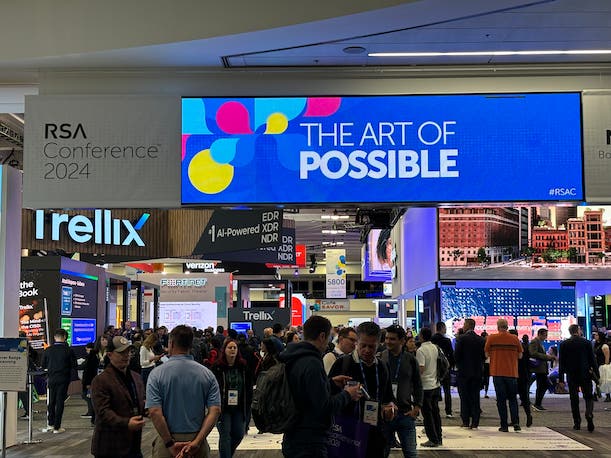The message from customers that they expect security products to work well together is increasingly being reflected across the industry, executives from top vendors and solution providers told CRN this week. Told.

Cybersecurity vendors are increasingly focused on meeting customer needs by effectively integrating with other vendors' products, reflecting a notable change in attitude in much of the industry, says top vendor a solution provider executive told CRN this week.
Challenges remain in the security industry, but executives at the RSA conference in San Francisco said signs of the beginnings of this change were everywhere.
[Related: 10 Cybersecurity Companies Making Moves At RSAC 2024]
The concept of partnerships between security vendors is not new. However, according to executives such as his CEO at Proofpoint, Sumit Dhawan, the motivation for consolidation is different now than in the past, with vendors focused on meeting customer demand for integrated platforms.
Previously, “as a cyber player” [industry]”We have generally worked on an arm's length approach and have done very selective integrations for convenience,” Dhawan said in an interview with CRN.
But major cybersecurity vendors are now “integrating to provide the best customer value, which is different than integrating for convenience to add functionality to a product,” he said. said. “That’s how I see the industry changing.”
Perhaps a long-awaited development, it comes in response to the convergence of a number of major trends in the world of cybersecurity. Customers and partners are struggling with tool disarray and complexity, a lack of talent to manage the tools, and an urgent need to enhance the tools from multiple quarters. safety.
As a result, more and more vendors are finding that the demand for consolidating their tools into a unified platform can be met through tighter integration with other companies in the industry, said Netskope co-founder said Sanjay Beri, CEO and CEO.
“I think there's a realistic middle ground where you shouldn't just have one platform for security and networking. Instead, let's eat a few [platforms]And we will integrate,” Berri told CRN. “I think that’s a bigger theme.”
When it comes to vendor consolidation, tool fatigue and the need to streamline security products among customers is “driving it even further,” said Bill, managing partner at Optiv, No. 24 on CRN's Solution Provider 500. Young said.
“That means now we don't want to have a bunch of different little tools running. We need to work together to get things done,” Young said. “So it feels like the story is, ‘How do we solve the sprawl of tools from industry?’” — The question became, “How do we make it?” [tools] Could it be even more valuable by integrating with other parts of the ecosystem?”
Ultimately, “I think that's why we're seeing a lot more conversations about integration,” he said. “It means, 'If I don't work well with other tools, I'm just an island, a dropped tool.'”
While many vendors were touting recently rolled out integrations in the packed exhibition hall at RSAC 2024, a series of new partnerships were also announced during the week of the show itself.
For example, the general availability of CrowdStrike's Falcon next-generation SIEM announced integrations with dozens of vendors including Netskope, Zscaler, Proofpoint, ExtraHop, Trellix, and Palo Alto Networks.
Data engine provider Cribl has announced two integrations with Microsoft and Wiz. This reflects the huge demand from customers for different tools to link together, said CEO Clint Sharp.
“What we're seeing in the market is that businesses want the best of everything across all categories of security,” Sharp told CRN.
Meanwhile, just before RSAC 2024, Orca Security and Aqua Security announced a new partnership and integration, despite previous competition between cloud security vendors in many areas.
There is currently “great cooperation” in the cybersecurity industry, said Securonix CEO Naaki Nayyar.
“Yes, we definitely want to compete,” she said. “But there are also integrations and partnerships that are becoming even tighter.”
Customers are “very clear”
Brian Palma, CEO of Trellix, which supports more than 500 integrations with other vendors, said customers have shown time and time again that they “don't want a bunch of siled proprietary systems.” Ta.
“We think it's way beyond the point,” he told CRN. “We should listen to our customers. They're pretty clear on that.”
Netskope's Beri said it's clear that even Microsoft, the industry's leading vendor with security features in nearly every category, is now more “open to integration” than it used to be.
“Many of these [vendors] Realize, “Did you know?” The world expects us to get along with everyone for the betterment of our customers. ” he said.
Dhawan told Proofpoint that the company's collaboration with several other major companies to enable tools to more effectively integrate with each other has revealed a “change in mindset” in the cybersecurity industry. Stated.
“While interacting with CrowdStrike in Palo Alto, [Networks]We can see that they have the same level of interest in doing that as Okta and other companies in the industry,” he said. “I really think so. [a major shift]. I think that's something the security industry has to learn and is starting to learn. ”


